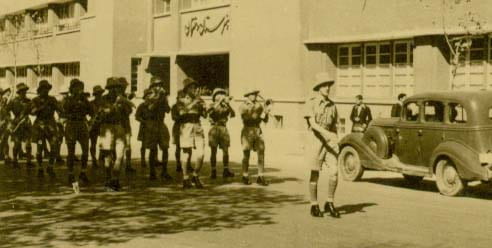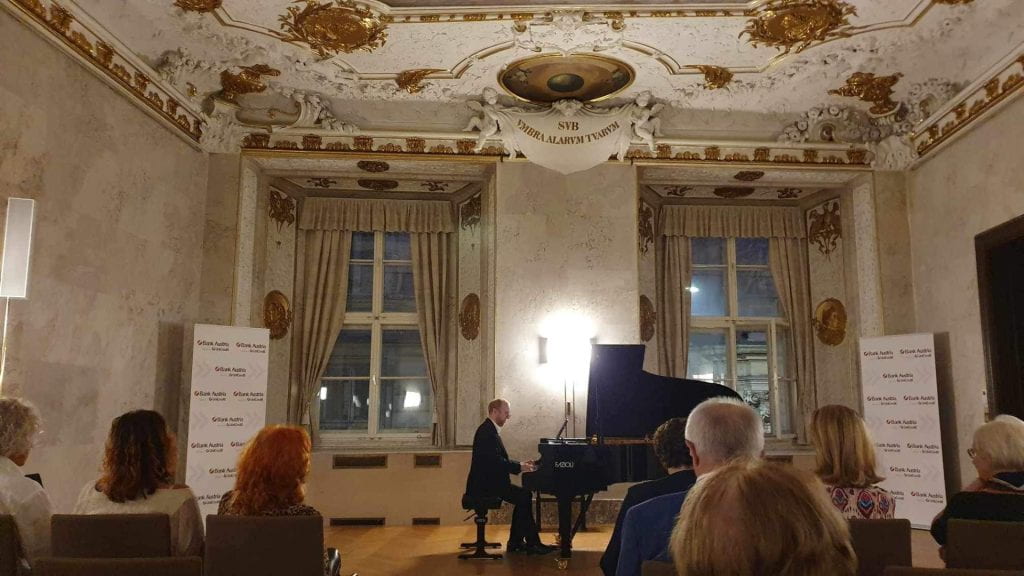Since his six-month residency at the PMC as Fulbright Scholar ended in July, pianist Andrzej Ślązak returned to Poland a few months ago and almost immediately began presenting to the public the results of his extensive research in our archives. Ślązak’s main areas of scholarly inquiry included film and orchestral music in our Bronisław Kaper Collection and Henryk Wars Collection, as well as a study of the Roman Ryterband Collection, a composer whose life and work are gradually being reintroduced to concert stages and in various international conferences and publications.
Kaper & Ryterband in Vienna
During a September 25 recital at the Neo-Gothic Old Town Hall in Vienna (pictured above), Andrzej Ślązak presented works by Bach, Kaper and Ryterband. He opened with three selections from Bach’s magisterial Die Kunst der Fuge and followed them with Roman Ryterband’s Nocturne in E-flat minor. His part of the program on that concert concluded with eight excerpts—highlights, according to the program listing—from Bronisław Kaper’s orchestral score to the MGM’s glamorous 1962 Technicolor production of Mutiny on the Bounty, with Marlon Brando, Trevor Howard, and Richard Harris in the main roles. During his time at the PMC, Ślązak worked on preparing a solo piano version of this score as well as arrangements for violin and piano, which hopefully will be heard on many concert stages in the near future.

The second half of this concert organized by the Gloria Artis International Arts Consortium featured the Syrian-born pianist, Ayham Hammour. A native of Damascus, he first studied there and later moved permanently to Poland to obtain his master’s degree at the Kraków Music Academy. More recently, Hammour received his Doctorate in Piano from the Łódź Music Academy and has been on the faculty of several universities and music schools in Poland. Active as a performer, Ayham Hammour presented the complete set of Rachmaninov’s Etudes-tableaux, Op. 39 in Vienna.
Wars in Kielce

The fall 2023 season continued to be quite busy for Maestro Ślązak since barely a month later, on October 20, he was the featured soloist in two piano concertos with the Świętokrzyska Philharmonic in Kielce, under the baton of Maestro Jacek Rogala. The concertos on the program were by Polish composer Henryk Wars (known in the U.S. as Henry Vars), and English composer Richard Addinsell. This pairing of two one-movement works is interesting for many reasons. Both composers were contemporaries—Wars was born in 1902 and Addinsell in 1904—and both died in 1977, Wars on September 1 and Addinsell on November 14. Not only their piano concertos are closely linked to film music, but both are based on Polish themes.
Wars’s Concerto uses as a theme his song “Po mlecznej drodze” [Along the Milky Way], which was written in Persia in 1942 when the composer and his ‘Polish Parade’ Orchestra were part of General Anders’s Army. This melody, first appearing in a lyrical piano solo version and later in an apotheosis at the end of the Concerto, was also used in the 1946 film La Grande Strada, made in Rome and scored by Wars. Starring Rena Anders (a Polish Parade soloist and Gen. Anders’s wife), this film depicted the ordeal of Polish soldiers beginning with their exile to Soviet Russia at the beginning of World War II to their release from Soviet gulags two years later. Once freed from captivity and labor camps, they joined the Allied troops in Persia, and later served in Iraq and Palestine. The wartime journey of these Polish soldiers continued in Italy, where Gen. Anders’s Army triumphed in the famous Battle of Monte Cassino in 1944.
Addinsell’s Warsaw Concerto was written as a soundtrack for the 1941 British film, Dangerous Moonlight. Set in the early days of World War II in Poland and starring Anton Walbrook, it was a story of a Polish pilot and composer who meets an American reporter and is one of the last to flee the Nazi bombardment of Warsaw in September of 1939. Later, after volunteering to fly for the Polish squadron based in England, he is injured in combat and suffers from amnesia. As he slowly recovers in a London hospital, he begins to recall composing his piano concerto in Poland’s capital and meeting the love of his life. The producers of Dangerous Moonlight wanted a lush, neo-romantic score and apparently asked Rachmaninov to score it, but he turned them down. So it was Richard Addinsell, who wrote a ultra-romantic score for this dramatic feature instead.

Just like with Wars’s La Grande Strada—where documentary footage was interspersed with studio-shot sequences—Dangerous Moonlight also featured actual aerial combat scenes with Spitfire fighter planes participating in the Battle of Britain and sets at Denahm Studios that were targeted by the Luftwaffe during the Blitz. This film proved an instant success with wartime audiences in Britain and the United States, even if some of the contemporary reviews were decidedly mixed. In any case, Addinsell’s Warsaw Concerto soon became a super hit with many concert audiences as well as one of Henryk Wars’s favorite pieces of music, according to the composer’s widow, Elizabeth Wars. Although the information on concerts given by Wars’s Polish Parade Orchestra is quite scant, there are some indications that they performed Addinsell’s Warsaw Concerto in the Middle East and Italy during World War II.
Composed in Hollywood in 1950, Wars’s Piano Concerto shares with Addinsell’s a heroic virtuosity and deeply lyrical melodic material. Interestingly, Wars originally wanted to call his composition the Milky Way Concerto, perhaps acknowledging Addinsell’s influence, but after revisions made in the 1960s, he went with a decidedly more generic title. Following its rediscovery in the early 2000s, Wars’s Piano Concerto—just like Addinsell’s Warsaw Concerto—has found much favor with the audiences throughout Poland whenever it appears on concert programs.
According to the soloist, Andrzej Ślązak, the audience present at his October 20 concert in Kielce with Maestro Rogala seemed to prefer the Wars over Addinsell:
The event attracted significant interest – I believe it’s the first time in a hundred years that the entire hall was sold out and everyone arrived on time. The audience was likely drawn by the program featuring Addinsell, Wars, Bernstein, and Gershwin, and also by the patronage of the rectors from the two largest universities in Kielce. Interestingly […] the audience favored the Wars Piano Concerto which, according to Dir. Jacek Rogala, was performed in Kielce for the first time.
The Polish Music Center is entirely donation-based, for everything from our operational budget to the growth of our vast library and rare archives. If you’ve found our website interesting and helpful, please visit our Donations Page. There you can donate directly to the PMC, knowing that a gift of any amount helps keep our website flourishing and our doors open. Thank you!
